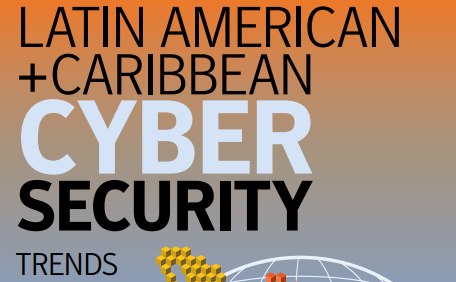
Cyber Security Trends
This report, from the Organization of American States and

Mr. Joao Duart de Canha has Engineering degrees in Telecommunications and Business Administration and has over 33 year of regulatory experience in the public and semi-public sector of the former country Netherlands Antilles and currently country Curacao.
Mr. J.D. de Canha obtained his Engineering degree in Telecommunications at the University of the Netherlands Antilles in 1980 and followed with an Engineering degree in Business Administration in Dordrecht Holland 1982.
In December 1982 Mr. J.D. de Canha started his career in the Telecommunications branch employed by Landsradio telecommunicatie dienst (Telecommunication, administration of the Netherlands Antilles), Landsradio telecommunicatie dienst – Radio controlle dienst was responsible international communication and the assignment – compliance of licenses for use of frequency spectrum of all the islands of the Former Netherlands Antilles: Aruba (until 1986 where Aruba obtained a separate status from the Netherlands Antilles), Bonaire, Curacao, Sint Maarten, Statia and Saba . During his years of career at Landsradio telecommunicatie dienst 1982 - 1995 he obtained extensive experience in the areas of policy development and advising, business administrations, regulation of frequency use, governance of Telecom and broadband sector, frequency management and reorganization of public tasks in the Telecommunications sector. He was involved in the restructuring of the Telecommunications Sector of former Netherlands Antilles when Aruba obtained its autonomous status in 1986. In 1989 he was in charge of the advising committee and also involved with the regulatory aspects with regard to the implementation of the First mobile telephony systems in Curacao and Sint Maarten. In 1993-1995 he was in the committee for developing the telecom legislation of 1996 (LTV – Landsverordening Telecommunicatie Voorziening 1996,196).
Since 1996 he was the deputy director of the newly established regulatory entity Bureau Telecommunicatie that was established by the government as the entity to regulate the Telecommunications sector in the former Netherlands Antilles. He was in charge of managing various projects including preparation for the liberalization of telecommunications sector (1996 - 2001) in the former Netherlands Antilles. He was also involved with the restructuring of the Telecommunication Sector with regards to creating the necessary regulatory framework for competition, international affiliation, adoption of innovation, introduction of competition and advising government authorities with regard to Telecommunications and Postal issues for alignment to international developments. Mr. J.D. de Canha was also the involved with the development of the Telecommunications sector and creating an equal level playing field between newcomers and the incomers, this was one of his greatest achievements. In 1998 Bureau Telecommunicatie had the additional responsibility to regulate the Postal sector, and its name was changed to Bureau Telecommunicatie en Post. The introduction of new Telecom Legislation and Policies for Liberalization in 1996 had profound changes that impacted the sector for which it was imperative that the necessary tools (regulatory framework and an autonomous regulator) had to be introduced for the fostering and guidance of the market players and stakeholders into achieving a state-of-the-art Telecommunication infrastructure, high quality and affordable services in a successful competition environment. This in anticipation of the liberalization of the Telecom market to be reached in 2001.
In June 2001 Mr. J.D. de Canha became the director of the autonomous entity Bureau Telecommunicatie en Post as the regulator of the Telecommunications and Postal market. During this period he has led Bureau of Telecommunication and Post regulatory agency successfully through the deregulation process and becoming an efficient regulatory body resulting in the respective constituency to gain all the benefits of the global telecommunication and related industrial evolution had to offer. He has also been advising the Government into adapting new policies and legislation of said sectors taken into consideration the basic approach for a well-developed regulatory framework for the Telecommunications and Post sectors. He has been fulfilling the function of the Director of the Bureau of Telecommunication and Post for the Netherlands Antilles and after October 2010 as the Director of the Bureau of Telecommunication and Post Curacao.
From 2001 to 2010 Mr. J.D. de Canha was personally in charge of multiple project that developed the Telecommunications sector of the Netherlands Antilles. These efforts resulted in a Telecommunications sector of the Netherlands Antilles who in 1996 was lagging behind in technological and competition into one that is recognized as one of the most advanced and technologically innovative sectors in the Caribbean.
Mr. J.D. de Canha is well-known in the region for his skills as innovator, initiator, achiever, facilitator, forward-thinking and enforcer and for his ability in adopting of the latest technologies. He is also known in fostering competition, opening the market that is in line with international developments ruling the Telecommunications sector.
A few of Mr. J.D. de Canha greatest achievements are as follow:
Over the last years Bureau of Telecommunication and Post has been recognized as the most innovative regulatory bodies in the Caribbean region by CTU and LACNIC Organization (2010 till 2015). These successes have led to the broadening of responsibilities bestowed upon his organization over the years, in 2009 Energy (Electricity, Water, Fuel), Economic Oversight Airport facilities and Health sectors were added to his initial portfolio of Telecommunications and Post. His experience of more than 30 years in the Telecommunications segment has helped him gain great insight and vision on the global telecommunications, energy panorama of the next years, as it relates to topics like quality of service, affordability, sustainability, universal services, cybersecurity, international capacity, technological evolution and adoption, provision of innovative services and protecting consumer interest.